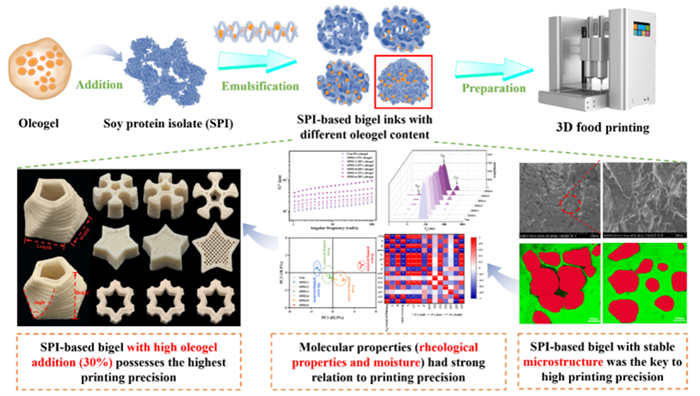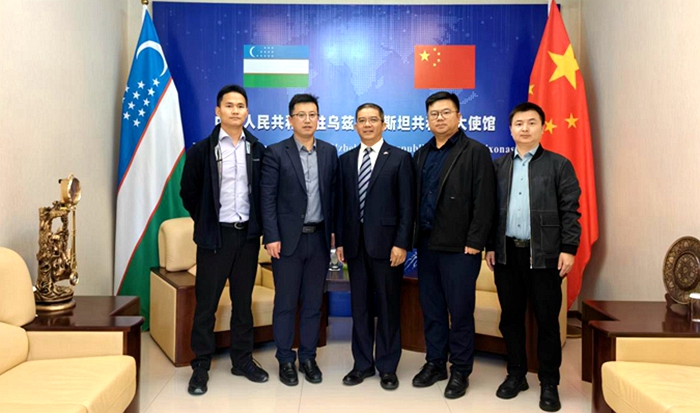A food-grade soy protein isolate bigel inks that enables high-precision 3D printing of hollow-rotating model developed by Institute of Food Science and Technology
Recently, Food Nutrition and Functional Food Innovation Team from the Institute of Food Science and Technology, Chinese Academy of Agricultural Sciences (IFST-CAAS), successfully developed a soy protein isolate (SPI) bigel ink system for high-precision 3D food printing. The research results were published in Food Hydrocolloids , top journal in the food field. Qiu Runkang, PhD candidate of IFST, and Qiu Guodong, Master candidate of South China Agricultural University are co-first authors of the paper. Prof. Wang Fengzhong and Prof. Liu Liya from IFST are the corresponding authors. This research was supported by the National Key R&D Program of China (2023YFE0107000, 2022YFF1102100, 2022YFF1100501) and the Yunnan Provincial Science and Technology Program (202204BI090012).
In recent years, the advantages of 3D food printing in the field of precision nutrition and personalized dietary research have become more and more prominent. It can provide more personalized dietary solutions by customizing food according to an individual's health status, nutritional needs, food preferences and lifestyle. As a new gel system, bigel has good thermodynamic stability and rheological properties, and is widely used in 3D food printing research. SPI is rich in nutrients, easy to digest and has good gelation and emulsification properties, and is regarded as an ideal source of high-quality plant proteins for 3D food printing. Until now, the SPI-based bigel food grade 3D printing ink has not been developed and utilized, and needs to be further explored.
The study found that the ratio of SPI-based hydrogel to oleogel played a crucial role in determining the rheology and moisture state of the inks. When the ratio is 7:3, the ink exhibits a stronger shear-thinning effect (flow index n = 0.135), which is more conducive to material-extrusion during the 3D printing process. Its recovery viscosity reaches 10.920 × 105 mPa·s, indicating strong structural recovery. Additionally, the ink has a higher yield stress, complex modulus, gel strength, and a higher proportion of non-flowing and free water. The ink enables high-precision printing of complex hollow-rotating model with more than 99% printing accuracy. This is mainly because the β′ and β crystals in the oleogel protect the structural integrity of the SPI hydrogel network while avoiding aggregation of the oleogel particles. Thus, Bigel ink microstructure can be effectively improved to withstand stronger shear stress during the extrusion process.
This research provides a new strategy for expanding the application of soy protein isolate and creating personalized, precision nutrition plant protein dietary products.
Link: https://doi.org/10.1016/j.foodhyd.2024.110052

Soy protein isolates bigel food grade ink for high-precision 3D printing of hollow-rotating model
-
 May 11, 2024WRI Deepens Agricultural Technology Cooperation with Agricultural Research Institutions in Uzbekistan
May 11, 2024WRI Deepens Agricultural Technology Cooperation with Agricultural Research Institutions in Uzbekistan -
 Apr 28, 2024CAAS President Meets President of Murdoch University
Apr 28, 2024CAAS President Meets President of Murdoch University -
 Apr 18, 2024Opening Ceremony of the Training Workshop on Wheat Head Scab Resistance Breeding and Pest Control in Africa Held in CAAS
Apr 18, 2024Opening Ceremony of the Training Workshop on Wheat Head Scab Resistance Breeding and Pest Control in Africa Held in CAAS -
 Apr 03, 2024IPPCAAS Co-organized the Training Workshop on Management and Application of Biopesticides in Nepal
Apr 03, 2024IPPCAAS Co-organized the Training Workshop on Management and Application of Biopesticides in Nepal -
 Mar 28, 2024Delegation from the School of Agriculture and Food Science of University College Dublin, Ireland Visit to IAS, CAAS
Mar 28, 2024Delegation from the School of Agriculture and Food Science of University College Dublin, Ireland Visit to IAS, CAAS
